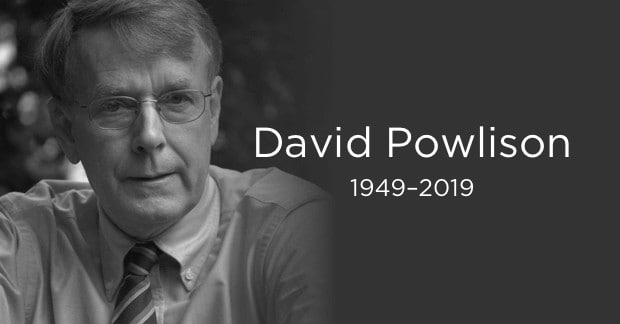David Powlison’s story stands out in modern debates that ask, “What has Christianity to do with psychology?” Powlison’s life rose to answer this question.
Before becoming a biblical counselor, David Powlison spent four years working in psychiatric hospitals, during which time he came to Christ. Every day he wrestled with the question: What can the gospel say to people with frightening and devastating psychiatric diagnoses?
As he received training in biblical counseling, Powlison began to care for people—body and soul—using the marriage of the Bible and psychology.
Powlison practiced biblical counseling for over 30 years, but he’s known best for his books, contributions to The Journal of Biblical Counseling, and time as Executive Director and faculty of the Christian Counseling and Education Foundation. He also served as a council member of The Gospel Coalition.
And now, following a battle with cancer, David Powlison (1949–2019) rests with the Wonderful Counselor he proclaimed to sufferers, sinners, and saints alike.
Below is an exhortation adapted from his article in The Journal of Biblical Counseling, Vol. 26 Issue 3, “The Pastor as Counselor.”1
***
Pastor, you are a counselor.
Perhaps you don’t think of yourself that way. (And perhaps your people don’t think of you that way, either.) Perhaps you don’t want to be a counselor. But you are one.
Unlike Proverbs, do you moralize, unhinging advice from deeper insight and deeper reasons? “Read your Bible … Just get accountable … Have your quiet time … Get involved in a ministry.” But proverbs point to the fruits of grace, not the means of grace. They never moralize. They press us with deep questions about what we most trust or fear. They present the God who actively gives wisdom to those who ask, and who continually intervenes in the consequences of our choices. They attune us to notice what voices persuasively bid to mislead us. Life-or-death moral decisions populate the proverbs.
Unlike Psalms, are you pietistic? “Just pray and give it all to Jesus. Pray this warfare prayer and claim back your inheritance from Satan. Learn mindfulness and listen for the voice of God in your inner silence.” But the psalms are neither pietistic, superstitious nor mystical. They teach us to speak a full-orbed honesty—putting our actual afflictions, sins and blessings into words; expressing the unfolding dance of actual experience and emotions; maintaining intent awareness of what God is like and what he says. The qualities of true humanness populate the psalms.
Unlike Jesus, do you speak in theological abstractions and generalities, putting a premium on cognitive ability? “Remember the sovereignty of God … Rehearse your justification and adoption by grace through faith … Hold in view the synergy between God’s active initiative and man’s active response in the sanctification process …” Shorthand jargon is helpful sometimes, but abstraction holds truths at arm’s length. Ministry talks with people. Jesus talks the way people talk. “Notice how God feeds the crows. The Son of Man came to give his life as a ransom for many. No one knows the Father except the Son and anyone to whom the Son chooses to reveal him. Come to me, all who labor and are heavy laden, and I will give you rest.” Ministry takes truth personally, and makes the implications up close and interpersonal.
Unlike Paul—no two letters and no two sermons ever the same!—do you offer the predictable boilerplate of a pat answer and pet truth? Are you a Johnny-one-note, reiterating one promise or principle as the panacea for every kind of problem and person? The apostle is nimble, continually adapting what he says to the contingencies and exigencies of each situation.
If you are a good counselor, then you are learning how to sustain with a word the one who is weary (Isa 50:4). This is wonderful, nothing less than your Redeemer’s skillful love expressed in and through . . . you. You’ve learned to speak truth in love, conversing in honest, nutritious, constructive, relevant, grace-giving ways (Eph 4:15, 25, 29). You deal gently with the ignorant and wayward because you know you are more like them than different (Heb 5:2–3). You bring back those who wander (James 5:19–20) just as God brings you back time and again.
In becoming a better counselor, you are growing into the likeness of Jesus Christ.
- If you would like to explore David Powlison’s many meaningful contributions, visit the Christian Counseling and Education Foundation (CCEF) or find his resources in Logos and Faithlife Ebooks. You can also read a moving testimony of Powlison’s life on The Gospel Coalition.





